




This edition marks the 3rd year since we embarked on the journey that is On the Coast Publications. It's been a fabulous time of growth, learning (lots!) and meeting extraordinary people that we are so blessed to have in our lives. We took a leap of faith with this adventure!
Someone else who took a leap of faith in his career is our fabulously entertaining, resident travel writer, Dorian Mode. This month, Dorian remembers how he started out in writing and travel and takes us back to where it all began, in Send them to the Tower, pg 16.
Back at home, as the cold weather continues, we are reminded of ways to stay warm and healthy, in Home Instead's article, pg 28, while Sam and Jordi share some updated winter looks in WRAP UP this Winter, pg 8.
As always, thank you so much Coasties for taking us into your lounge rooms.
Love and light always :)
Art Director
Tanzie Carpenter tanzie@onthecoastpublications.com.au
Production Luke Carpenter luke@onthecoastpublications.com.au
Editor Jessica Sanford editor@onthecoastpublications.com.au
Publisher
Tanzie Carpenter / 0414 611 851 Luke Carpenter / 0405 449 339
trading as On the Coast Publications ABN 52 212 212 482 PO Box 3251, Bateau Bay NSW 2261
For advertising enquiries advertising@onthecoastpublications.com.au
For article contribution enquiries hello@onthecoastpublications.com.au
Imagery freepik.com
Contributors
Sophie Doyle, Sam Woods, Jordi Woods, Sarah Tolmie, Dorian Mode, Lydia Thorpe, Carin Clegg, Dr Nicholas Altuneg, Home Instead Central Coast
onthecoastpublications.com.au proudly supported by
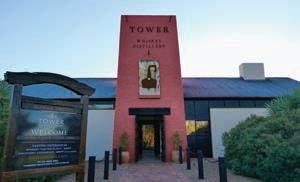



Wyong Bowling Club first opened its doors well over one hundred years ago and is still going strong. The Bowlo is in fact, the very first Bowling Club established on the Central Coast.
Situated on the banks of the picturesque Wyong River, the Club’s Men’s and Women’s Bowls teams over the years have represented the Club with great distinction, always competitive, they have won many major awards and championships and remain a major force in the sport.

The Club is not just about serious bowls competition. It also provides a perfect environment for those wanting to enjoy the sport at all levels, from beginners, barefoot, all the way through to elite tournament standard. Just as important, the social side of the club provides plenty of fun activities every day of the week in a unique, laid back, country–style atmosphere where you
So, if you are considering taking your bowls game to a new level, maybe you are wanting to find a way to rekindle your passion for Bowls, even if you have never played the great game before, Wyong Bowling Club provides something for all, in one warm and hospitable location.
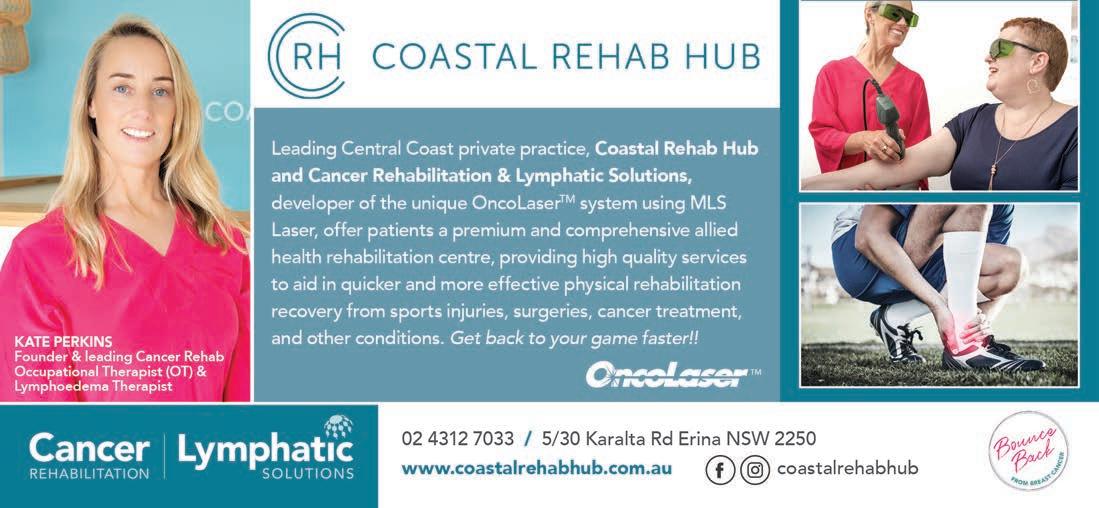
BY SOPHIE DOYLE, RETIREMENT AND FINANCIAL AGED CARE SPECIALIST

Navigating the transition into residential aged care can be a daunting process, often fraught with complicated rules, family conflicts and tight timeframes. Such circumstances can easily lead to costly mistakes that are challenging to rectify. This article sheds light on three common pitfalls and offers tips to avoid them.
One of the most significant expenses you’ll encounter is the cost of your room, often quoted in hundreds of thousands of dollars. However, instead of a lump sum, you may opt to pay a daily fee.
Signing contracts under pressure can lead to hasty decisions, potentially locking you into a quick home sale. Take your time to understand your options and make an informed decision. Providers are mandated to allow 28 days post–move–in for payment
deliberation, affording you the chance to seek advice and prepare.
While it’s crucial to comprehend the fees payable on your first day in residential care, this is merely the starting point. Your fees evolve over time, influenced by decisions made post–entry and changes in your circumstances. Ensure you anticipate fee variations over the subsequent 2–5 years, with projections showing anticipated shifts in fees, age pension, cash flow, and asset values.
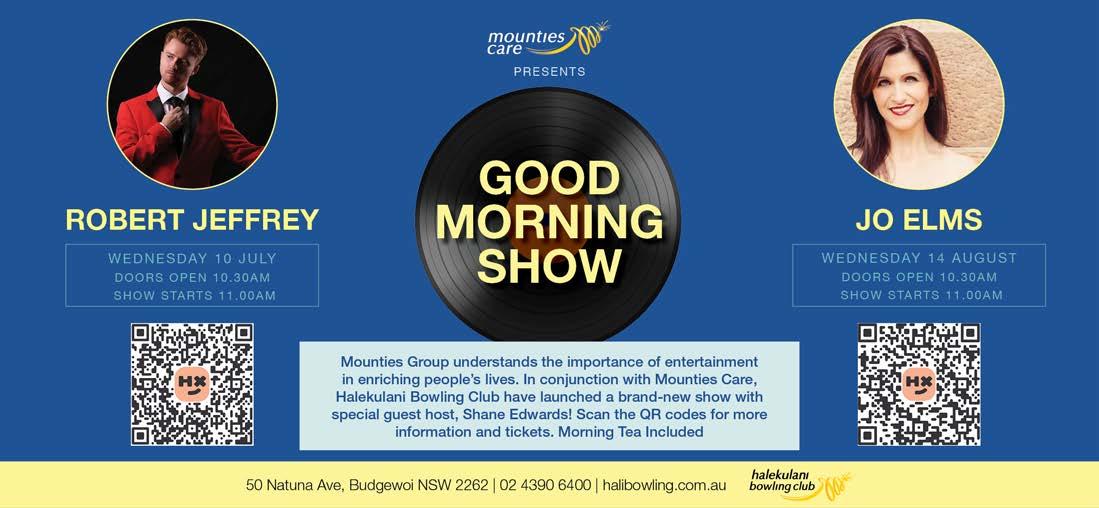
Your fees evolve over time, influenced by decisions made post–entry and changes in your circumstances
Services Australia needs to review your financial position to calculate your fees. To enable this assessment, you need to complete some forms and update Centrelink (or Veterans’ Affairs) records.
If you fill in the wrong form, or provide incorrect information, your fees might be incorrectly calculated or cause long delays with the assessment.
Even if your situation seems simple, there are so many aspects to consider in

working out the best financial strategy. Consulting with an accredited aged care adviser provides peace of mind, ensuring you’ve made prudent decisions to sustain adequate cash flow while safeguarding your estate’s value.
If you wish to explore your options or seek tailored advice, please don’t hesitate to contact our office on 02 4325 0884 to arrange an appointment.
Morgans Financial Limited | 1/6 Burns Cres, Gosford | morgans.com.au/gosford
If you fill in the wrong form, or provide incorrect information, your fees might be incorrectly calculated or cause long delays with the assessment
Sophie Doyle (AR#000470612) is a Retirement and Aged Care Specialist at Morgans Financial Limited (Morgans AFSL 235410 / ABN49 010 669 726); with a passion for assisting people make informed financial decisions, as they navigate their way through retirement and aged care.
Disclaimer: While every care has been taken, Morgans Financial Limited makes no representations as to the accuracy or completeness of the contents. The information is of a general nature only and has been prepared without consideration of your individual objectives, financial situation or needs. Before making any decisions, you should consider the appropriateness for your personal investment objectives, financial situation or individual needs. We recommend you see a financial adviser, registered tax agent or legal adviser before making any decisions based on this information. Current as at 24 April 2024.

BY SAM & JORDI WOODS
This season size matters when it comes to scarves and wraps. Oversized and chunky knits are everywhere however, not everyone feels comfortable draping them around their neck as they can feel very bulky and overpower some silhouettes. If this is the case for you then try some of the style suggestions below and warm up your winter wardrobe with this versatile and handy accessory for when the weather is unpredictable and you may (or may not) require an extra layer.

Throw your wrap over one shoulder and secure at the waist with a belt. If belts aren’t great for your body balance, use a brooch or oversized kilt pin.

Opt for a triangle shape wrap so you can wrap it around your shoulders and fasten or tie the thinner ends at the front or off centre.
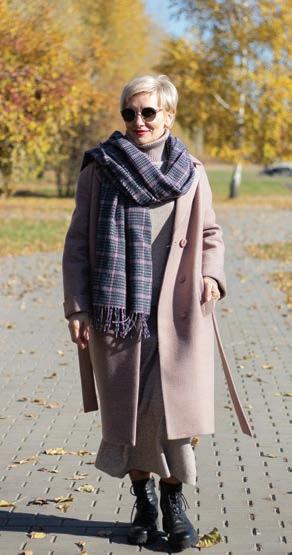
If you are more of a “throw and go” kinda girl then draping a chunky scarf around your neck and hanging the ends down your torso will ensure you are snuggly warm and add interest to your outfit.

TIP : This Winter a check print is trending however an animal print is never out of style either!
Vibrantly yours, Sam & Jordi Woods x
Accessories featured are from the Vibrant Concepts Style Studio – Erina.
Understanding styling and fashion is one thing. Having a super natural flair for making everyday people look incredible is another. Once you’ve met Sam & Jordi Woods, it’s hard not to catch their infectious passion for dressing to match your own lifestyle, personality and charisma. Through their consultancy ‘Vibrant Concepts’, Sam & Jordi have transformed the lives of thousands. Let Sam & Jordi show you how to look and feel fabulous every day at their Style Studio in Erina – learn the art of illusion dressing, colour matching, styling, translating fashion trends and savvy shopping with their unique VC Signature Styling Systems and services that are truly personal and really work! To contact Vibrant Concepts phone 0425 221 676

If this sounds familiar, you might be one of the 5 to 8 per cent of the population who suffer from obstructive sleep apnoea (OSA). OSA is a serious medical condition. If untreated, you not only feel very tired, but OSA can have an impact on all areas of your life. Here, we tell you about OSA and steps you can take to treat it.
Snoring is not just a funny thing that humans do. Snoring can be destructive for relationships, causing couples to
move into separate bedrooms. If one partner struggles to nod off while their sweetheart snores like a train the minute his or her head hits the pillow, there’s a chance neither partner is getting a good night’s sleep.
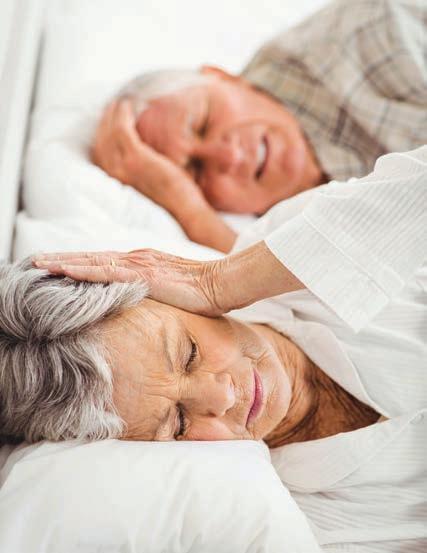
Snorers might look crashed out, but if they suffer from sleep apnoea, there’s a strong chance they are not getting the deep, restorative sleep their bodies need.
The reason for this is that sleep apnoea
sufferers actually stop breathing, due to a narrowing of the airways. The brain then alerts the body to the loss of oxygen, and the sleeper becomes aroused out of sleep, gasping for another breath.
But sleep apnoea sufferers are often unaware of these repeated nocturnal arousals. Over time, these apnoeas can add up to hours of oxygen deprivation


and have a serious impact on the body and brain.
Sleep apnoea is a recognised medical condition, and if untreated, can contribute to problems with blood pressure, diabetes, stroke, heart disease, depression, relationship difficulties and more. So what can you do if you have concerns about your sleep health?
Your first step is to chat to your GP. They can refer you for a Medicare–funded sleep test with Pacific Sleep, where you will have a consultation with one of the Central Coast’s leading sleep and respiratory specialists as part of your sleep diagnosis.
Pacific Sleep specialises in home
diagnostic sleep testing. The Pacific Sleep clinicians will set you up with a home sleep test. The test is done in the comfort of your own cosy bed.
After the test, you’ll come back to the clinic where the sleep specialist will explain the results of your test to you and recommend any treatment. The Pacific Sleep team will explain CPAP or other doctor–recommended therapies to you, and assist you to trial these therapies, as a part of any lifestyle changes you might need.
The Pacific Sleep team at Gosford and Toukley has been helping sleepy people for over 15 years. Founded by Paul–Andre Thierry and his wife Alison in North Gosford, Pacific Sleep is a truly
local Central Coast business. Our sleep clinicians and customer care team are passionate about helping people find their way to better health through healthy sleep.
If you have concerns about your sleep health, call us today on (02) 4339 1222 or visit our website www.pacificsleep.com.au.
We promise we won’t rest until you get a good night's sleep… Suite 2, 14–18 Jarrett Street, North Gosford, on the North Gosford Private Hospital campus.

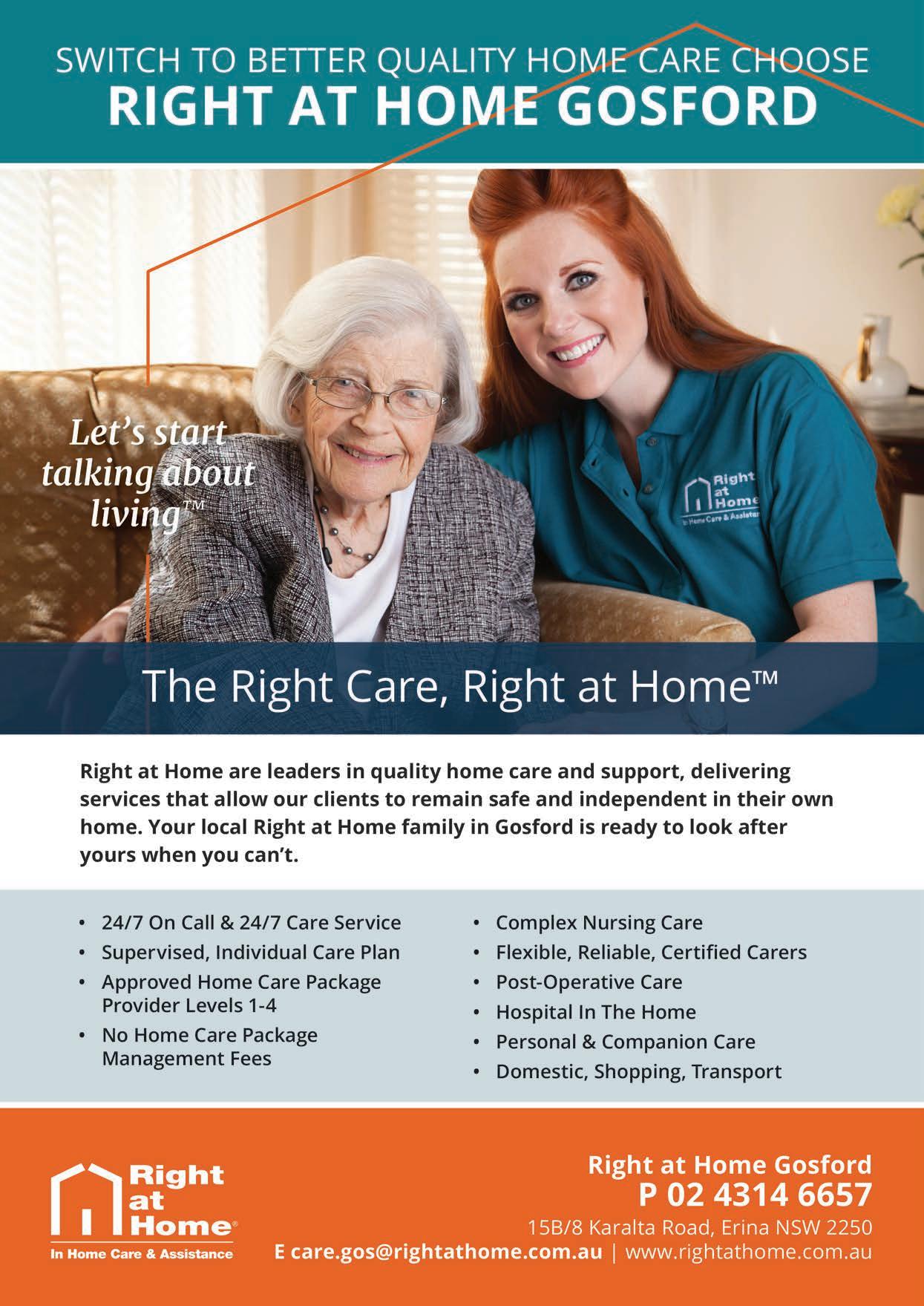
BY SARAH TOLMIE
READER QUESTION: “I have been deeply unhappy in my marriage for a long while and it has recently built up inside me so big that I can’t hold it in anymore. I have weighed up a list of pros and cons in my head and all that is keeping me there is the children. My husband is a good guy. I love him but I am now not in love with him. There are so many things that have been left unsaid for so long. Little things that now are huge things. I’m afraid I am going to hurt him so badly but I don’t think I can stay. I’ve heard of ‘conscious uncoupling’. How can I suggest we do this?”
My heart breaks when I hear your story. It is the story of so many good couples with a promising life and love ahead of them. Everything suggests a good life can be possible, and yet, the relationship, when faced with stress, challenge, change and crisis moments, hasn’t performed well and couples didn’t do timely and right repair and recovery; and they didn’t evolve a set of skills, wisdoms and knowledges into the relational system to ensure it's robustness.
Most of us don’t get explicitly taught healthy relationship skills – we learn from our family of origin relationship survival techniques. Expressing “love” – giving, receiving and maintaining healthy love over a lifetime – needs high relationship skill. Without intentional skill and discipline to maintain relational wellbeing, even the deepest of loves can lead to drift, disengagement, disconnection and dissatisfaction. The ‘love energy’ can literally run out and the relationship can become unsustainable for one or both parties.
When I hear “we love each other but we’re not in love with each other”, what I really hear as a relationship therapist is: “we love each other, but we have not been participating in being loving and skilfully loving”. This is a modern tragedy I see play out in my practice room regularly. In our desire to avoid hurt we create even bigger ones.
What is hard to say, but true, is that the ones we love will hurt us. They will
disappoint us, break our trust and ‘make us’ feel all sorts of big hard negative feelings. Relationships are growing endeavours – they are not meant to ‘make us happy’ – that is the natural byproduct of taking accountability for both relationship and personal health and wellbeing.
Relationships are meant to continue to grow us and evolve us and better us. They can even help to heal us, because this is the other hard thing to say, but it is true, all our stuff, all our wounds, traumas, frailties and shadows are worked out through and in the relational field. Our partner can either be our healing partner (and we can be for them) or we can become the agents of each other’s re–suffering.
Our responsibility and commitment in relationship is to acknowledge feelings and wrongs and problems and attend to them. It’s up to both parties to address issues, take accountability, apologise and atone and make amend then adapt and action new skills to ensure it doesn’t happen again. And maybe that means you must both learn the skills if you don’t have them.
I wish someone skilled my husband and I in the early years of our marriage, and especially before kids, with the knowledge of healthy and thriving relationship practices and mindset. It might have saved us a lot of pain. I wish all couples could know 2 key things:
Before you even have children, know you already have a child – it is your relationship. It is a living, breathing, growing, changing entity that needs attention, nourishing, play, pleasure, safety, shelter and love. This would ensure you don’t sideline and de–prioritise the relationship when kids come along.
Get skilled in a healthy approach to ‘managing conflict’. In the Gottman Couples approach, managing conflict is not actually ‘doing conflict’. Unhealthy and unskilled conflict is done by – attack, avoidance and accommodating (and building resentment). A healthier mindset and skillset approach of ‘managing conflict’ is about acknowledging and accepting each other’s differences and negotiating with understanding and empathy, with a 'we' mindset, to maximise both individual and relationship wellbeing. We must be able to share feelings and give feedback in a loving, safe, respectful and productive way. When you manage conflict well – it transforms into the muscle and connective
tissue of relationship. Conflict becomes Connection. By suffering in silence, or avoiding conflict, or doing conflict badly –we only create resentment, blame and hard feelings that stick, fester and push us apart.
You are about to make a solo “ME” decision for a together “WE” problem. Yes, you have made a pros and cons list – but from a terrible place of disengagement and isolation. Yes, you can leave the relationship – but you are making the decision from a terrible place of pain, resentment and maybe blame. It is very hard, if not impossible, to solve a relationship problem alone. No wonder this approach inevitably leads many to consider leaving as being the only solution.
Up to now your partner has been given no agency, participation and choice in determining the outcome. It doesn’t sound like there has been any real and productive or skilled conversations about your stuck and hard feelings or any deep listening to each other. I can only imagine he will be blindsided. He will not be as far down the track of separation as you (if on that track at all) and he will not be in a same/ same place to even consider ‘conscious uncoupling’. Conscious uncoupling is when a couple arrive together at a mutual decision that a relationship has reached completion and they both want to exit –with shared accountability, grace, respect and friendship intact. There is no mutuality assured here yet – there is no shared accountability – if anything, your approach sounds like ‘unconscious’ uncoupling.
Many couples find their way into my therapy practice in this predicament. My best advice is to seek professional help so you can have these first, hard conversations with support, safety and guidance. Slow everything down. Just stop and hold position from going any further apart – if only to allow him to catch up. It is like you are two trains going in different directions. Your train is about to take off. What you need to do is stop your train at the station, and both get off your separate trains and find each other on the centre platform.
Whether you end up staying together, or separating, you still will be in lifelong relationship – as parents. You will still need to do your healing. Start that on the right track. You both deserve that care.
Much love, Sarah x
Sarah Tolmie – Life & Love: Sarah is a marriage therapist, life & love and relationship coach, end–of–life consultant, an independent and bespoke funeral director and holistic celebrant. She provides holistic care, mentoring, guidance, healing and transformation for individuals, couples and families at their most important times of life & love – at end–of–life, in love & relationship, and in ritual and celebration. Sarah has a relationship online course for couples called “Creating a Miracle Marriage”; a wellbeing course, called “How do you feel?”; and a free resource and video series for families facing dying, death and grief called “Landscapes of Life & Love and Loss”. To find out more, visit www.sarahtolmie.com.au and www.lifeandlove.teachable.com


Move over Russell Brand and Matt Rife, comedy has a new bad boy, and his name is Pete Helliar.
A stalwart of the nation’s stand–up scene, Helliar has been one of Australia’s favourite comedians since his first appearance on our TV screens on the Logie Award winning Rove back in 1999.
Since then, Helliar’s amassed more than 20 years in the entertainment biz and proven himself a man of many talents – comic, writer, presenter, producer – but throughout it all he’s always maintained his nice guy image, until now.
Pete’s gone bad. Come find out what pushed him over the edge in his new show: Pete Helliar Gives Zero Flips.
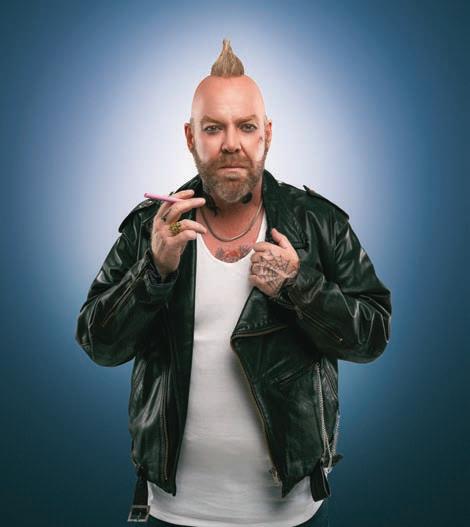
He’s so bad he wanted to use a different F–word in the title. Scandalous! All the fun kicks off this July. Bring your own pearls to clutch.
“Give Peter Helliar a stage, a microphone, some bright lights and a captive audience and he shows why he is one of the nation’s favourite comedians.”
– Sunday Mail
“Wonderful… a bizarre revelation.”
– The Age, Melbourne
“Peter Helliar makes the difficult business of being funny look dead easy.”
– Adelaide Advertiser
The Art House presents Pete Helliar Gives Zero Flips Fri 19 July – 8pm
DURATION
60 minutes, no interval
WARNINGS Contains strong language and adult themes, recommended for ages 15+
TICKETS
$45 | Encore Members: $38
CONTACT Kristina Reddaway (02) 4335 1485
kristina@thearthousewyong.com.au
BOOK NOW! https://www.thearthousewyong.com.au/whats-on/pete-helliar-gives-zero-flips


Send them to
WORDS BY DORIAN MODE PHOTOGRAPHY BY LYDIA THORPE
My journey into writing was a happy accident. My early life revolved around tickling the ivories at the Sydney Conservatorium of Music. Writing? Cultural satire? Those were foreign concepts. But, as fate would have it, I discovered a knack for weaving words and making people chuckle – a revelation that even Penguin couldn’t ignore, publishing my early novels.

I began by writing humorous essays for a bestselling sports magazine. It wasn’t very PC then, with its bikini–clad centrefolds. The only stories on women’s sport were afterthoughts to the latest protein shake recipe. Indeed, the magazine thought gender equality meant including a token article on netball, but only if it featured “the pretty one” in a cocktail dress.
My editor was Greg Hunter. He was an old–school, tough–as–teak scribe who mentored many young aspiring writers. He was brutal, sending my copy back more times than I care to remember, but always with constructive criticism on how to shape it for resubmission. Even now, with a swag of post–grad degrees, I never learnt as much about writing as I did from those kicks in the literary crotch from The Huntsman.
When Greg left the centrefold sports mag to become the founding editor of a new travel magazine (the mag is still going strong surprisingly), he took me with him. The problem was, I didn’t travel. Moreover, I wrote my satirical
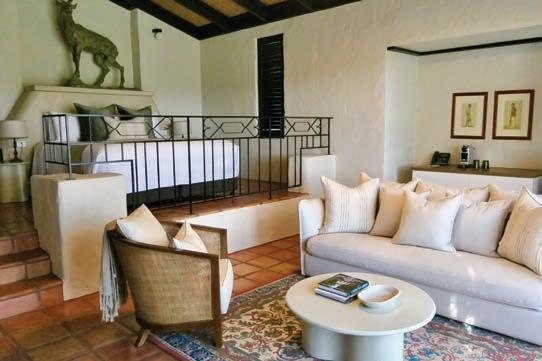
Tower Lodge is everything we remember and more –like discovering your favourite childhood ice cream now comes with an extra scoop and a Flake speared on top
sports yarns while watching games on TV, from the comfort of my armchair with a beer and packet of kettle chips. I never went to a game.
Finally, I confronted him.
“Greg, I have to tell you, I don’t travel.”
“Well, that’s about to change, Champ,” he replied.
And change it did. Greg commissioned features from various exotic locations around Australia. But battling severe depression, I became despondent travelling on my own. I had a tough childhood; my parents divorced


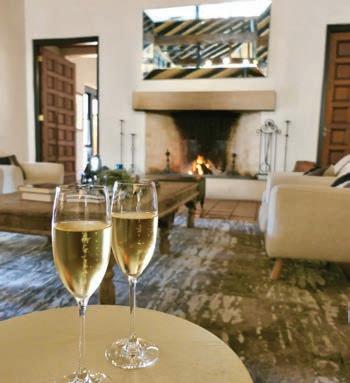



So does Tower Lodge still have the wow factor after 20 years? Well, the answer is “yes”. Indeed, the glamour is evident from the cobblestone entrance to the huge gothic wooden doors at reception.
when I was a toddler, and my mother eventually moved to New York when I was 10, leaving me in Australia with Dad. Clearly, I wasn’t her favourite. Tricky when you’re an only child.
Joined at the hip with my wife (now married 35 years), I asked if she’d develop her photography skills so we could travel as a team. Being a busy mum then, with two growing boys, she reluctantly agreed. (These days she is a widely published travel photographer, often making the front cover with her work).
Our first assignment for the magazine (over 20 years ago) was the Tower in the Hunter Valley. The Tower conjures up images of Anne Boleyn’s head rolling past your breakfast table, doesn’t it? So we approached our review with some trepidation.
These days we are the senior travel writing team for the biggest travel mag in Australia, but back then, the
only accommodation we’d experienced was your typical Norman Bates Motel: harsh neon lighting, a dribble of water pressure in the shower, and sheets not renewed since disco was in style. The continental breakfast is none too continental: cornflakes, a stale muffin, and washed down with a cup of bogan dust (instant coffee).
We’d never experienced glamour like Tower Lodge. I remember sleeping on sheets that were like the wings of angels. My wife explained they were 100% Egyptian Cotton. No wonder those mummies survive all those years, I thought. Moreover, dinner at nearby Roberts (Tower didn’t have a restaurant then) was a romantic stroll through the moonlit vineyard with a torch, only to enjoy a spectacular seven–course degustation meal, which for me up until then, was a six–pack and pie.
So does Tower Lodge still have the wow factor after 20 years? Well, the answer is “yes”. Indeed, the glamour is evident from the cobblestone entrance to the huge gothic wooden doors at reception. The rooms are spacious, opulent, and designed with comfort in mind.

Ours is a French–themed room with cathedral–worthy headroom. Each room boasts unique designs with modern finishes and furnishings for a new twist. Ours has a private courtyard, and a generous bathtub, an inviting lounge area. Psst! We adore the rooftop hot tub on the Tower Suite with views over the vineyard.
There is a pool enclosure, ideal for a dip or sunbathing. Guests can also arrange for bikes to be ready at their door, enjoy a round of golf, or take a leisurely walk along the numerous cellar doors and restaurants that are close enough to explore on Shanks Pony.
We begin our evening with a glass of bubbly by the fireplace before a fabulous gin tasting/masterclass. Then we dine at Tower’s famed Sebastian’s Restaurant. Deeply rooted in the rich winemaking history of the Hunter region, the Tower was originally founded by the esteemed Len Evans AO OBE, along with some of the area’s top winemakers. Unusual at the time, but a bold statement about the Hunter’s future. So with chef Anthony Fullerton

in the wheelhouse, the food at Seb’s is a highlight.
Sitting under high ceilings with lazily wheeling fans, the restaurant and its terraces provide a relaxed yet refined dining atmosphere. The nearby kitchen garden supplies herbs, greens, and native ingredients, while the pasture is home to the owner’s Angus cattle. So it would be criminal not to choose the beef, right? This we pair with a Virgin Hills Cab Sav Shiraz Malbec. Sipping it, I detect hints of cherry and plum, with a light, dry finish that whispers, “I’m sophisticated,” while I nod in agreement, pretending to know exactly what that means. For 20 years I’ve been writing about food and wine and know nothing about food and wine.
Hearing it was a sentimental assignment for us, owners Michael and Karen Hope join us for dinner. Quite the honour. We instantly click. We discover the Hopes acquired Tower Lodge in 2013 and spearheaded a $6 million renovation in 2019. Psst! This explains why it seems more glamorous than last time. They collaborated with a Newcastle–based firm, to revamp both the exterior and interior, infusing the lodge with their personal style and furnishings, creating a luxurious yet homely atmosphere. Moreover, they also own a little vineyard over the road you may have heard of: Hope Estate.
Indeed, Michael Hope’s story is fascinating unto itself. He modestly describes himself as “a country boy from Young.” This “country boy,” however, managed to build a thriving chain of pharmacies in rural NSW and Sydney before deciding dispensing aspirin wasn’t as fulfilling as he wished.

So, in 1994, Michael swapped his white coat for gumboots, abandoning his pharmacy career to chase his dream of establishing a premier winery in the heart of the Hunter Valley. And thus, Hope Estate was born – because when life gives you grapes, you make wine, right? These days, Hope Estate is a rockstar of vineyards, with concerts by The Rolling Stones, Elton John, Bruce Springsteen, Dolly Parton, Carol King.
Sitting under high ceilings with lazily wheeling fans, the restaurant and its terraces provide a relaxed yet refined dining atmosphere
The following day, we stroll next door to Tower Whiskey to enjoy an erudite whiskey tasting and neck Michael’s first four single malt, single cask whiskeys. A mixture of new and old, French and American oak Hogshead, Barrique and Puncheon casks have been used to age the new make spirit. We loved the aesthetic of this place; a gentleman’s club meets Spanish villa. But alas, we are more gin people.
I was worried the Tower Lodge wouldn’t live up to the memory of our first travel writing commission; like a kid revisiting a favourite childhood theme park, only to discover the rides are smaller and the mascots a bit creepy. But, to our delight,

Tower Lodge is everything we remember and more – like discovering your favourite childhood ice cream now comes with an extra scoop and a Flake speared on top. As I gaze over the Tower’s twilight–kissed vineyard, roos lazily grazing before the vines, I sit with a G&T made from Michael’s rather excellent gin, pondering the last 20 years. Tragically, Greg Hunter took his own life some years ago. So I raise my glass to The Huntsman and toast his enduring influence on my life and writing. Greg, here’s to the wisdom you shared, the inspiration you provided, and the lessons that continue to guide me as a writer. But mostly for making me get out of my Jason Recliner to see the world.
Midweek Winter Escape. Stay for 3 nights, pay for only 2 nights. The Midweek Winter Escape offer is valid for midweek stays (excludes Friday and Saturday) from now until September 30, 2024.
The on–site Restaurant is open 7 days for Lunch and Dinner, available for guests and members of the public.
Every in–house guest receives a complimentary Whiskey Tasting Experience at Tower Whiskey Distillery.
Our dedicated Accessible Suite features 2 x Queen beds and assisted functionality throughout. There are Daily Masterclasses available for all in–house guests to enjoy.
www.towerlodge.com.au
www.towerwhiskeydistillery.com.au
www.hopeestate.com.au
This year’s 2024–25 NSW State Budget has been delivered by the NSW Treasurer and sadly, it is a bad one. This Budget fails NSW and confirms that the Government will collect more revenue than any government in the history of our state but it doesn’t offer a cent for new cost of living support. There are cuts to schools, hospitals, frontline services and infrastructure.
Unfortunately, the people who will suffer are families and seniors. For families, we are seeing no additional cost–of–living relief when school supplies and household costs are continuing to skyrocket. Our children’s futures are going to be impacted as well, with a total lack of funding for school upgrades in the Terrigal Electorates, and only $1.4 million for school upgrades to three Central Coast schools.
We will receive only two public childcare centres as compared to the Hunter, which will receive 14 and Illawarra–Shoalhaven, which will receive 10. We have been simply left behind, and it’s not right. The Central Coast is a young, fast–growing region and we need strong voices in government who are prepared to do the work to help our region grow.
Public school education, cut by $149 million in the Budget is down right across the Central Coast. For my seat of Terrigal, there has been a collective $500,000 cut across the allocated funding under the Resource Allocation Funding. Funding has gone backwards at all schools in my electorate except one, which will receive an extra $3,000.
Seniors will miss out too, with the Budget failing to provide funding for the massively successful Regional Seniors Travel Card, which was utilised by over 40,000 seniors on the Central Coast providing massive cost–of–living

relief to some of our most vulnerable.
Land tax thresholds will be increased for the 2024 land tax year, meaning more mum and dad investors and self–supporting seniors will hurt their pocket in the name of revenue raising –$1.5 billion in fact.
Infrastructure spending is suffering too, with little funding spread across the Central Coast for major congestion busting upgrades, such as the upgrade of the Central Coast Highway from Wamberal to Bateau Bay, which received no new funding.
This Budget is bad, and that means it is bad news for the Central Coast. It is by far and away the worst Budget for the people of my electorate, with a complete abandonment of responsibility to act on the cost–of–living crisis.
The Central Coast is a young, fast–growing region and we need strong voices in government who are prepared to do the work to help our region grow
With skyrocketing house prices, rent and a complete lack of cost–of–living support, everyone will suffer. As Member for Terrigal, I will continue to call out the local Government MPs who have to date not lifted a finger to help the people of the Central Coast and are unwilling to own up to their mistakes. The 2025–26 NSW Budget must be better, for the sake of our region and NSW.



BY CARIN CLEGG, ACCREDITED PRACTISING DIETITIAN
As the winter days take hold, one thing I hear a lot from people is that they do not drink as much water in the cooler months. Read on to learn about dehydration and tips to stay hydrated.
Dehydration is more of a health risk for the young and older people where it can cause problems like:
Heat injury like heat cramps, heat exhaustion or heatstroke, which is more likely to occur when exercising or perspiring heavily such as in warmer weather.
Urinary tract infections, kidney stones and even kidney failure.
Seizures and loss of consciousness.
Low blood volume shock, which causes a drop in blood pressure and a drop in the amount of oxygen in your body.
Did you know that if you feel thirsty you are already dehydrated? So, having a good habit of drinking fluids over the day including during the winter months is the best way to avoid dehydration and associated risks, particularly as you get older.
All types of fluids count when we are talking about staying hydrated: tea and coffee, fruit juice, cordial, soft drinks, milky drinks, and soups.
At each meal and snack serve everyone with a large cup of water.
Find a cosy quiet spot to sit, ponder your day and savour the full sensations of your desired hot beverage and have some me time
Drink water from a large cup or glass. For adults, a cup that holds at least 250ml is ideal. The bigger the better!
Own 2–3 drink bottles so there is always one available at home, work, school and in the exercise bag.
Keep your water within eyesight.
Use an alarm to remind you to stop
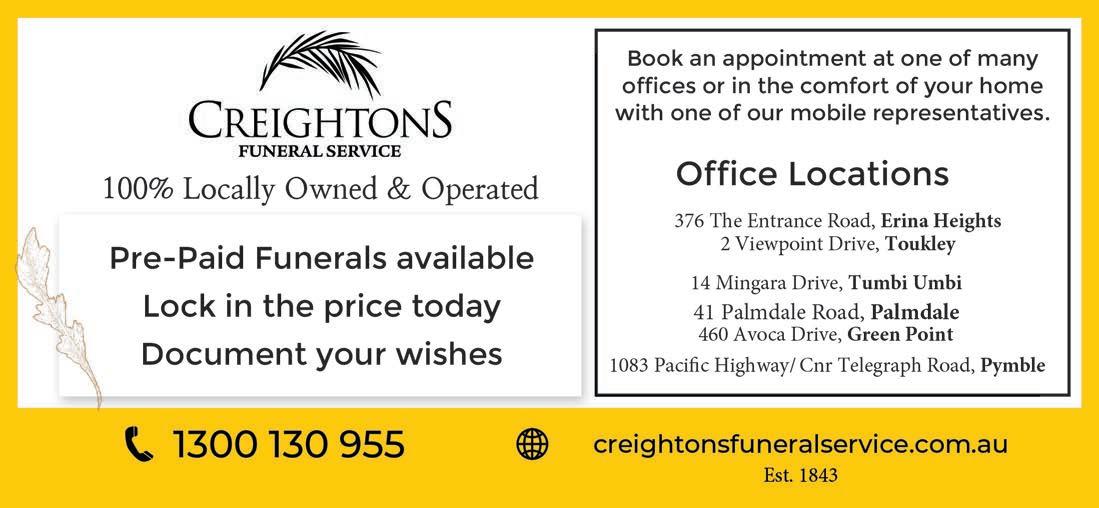
for a drink.
On cold days add a touch of hot water from the kettle to take the chill off tap water.
Make a big batch of soup and eat it for afternoon tea.
Add some zest with citrus fruits like lemon, lime, or oranges.
Try other fruits like berries, kiwi, pineapple, apple, or pear.
Add herbs like mint, basil, or thyme.
Crunch on ice cubes.
Enjoy a hot cup of tea or coffee at each meal and between meals. Coffee is still a hydrating drink and up to 3–4 coffees a day is not considered detrimental to health.
Try some different herbal teas, with so many different brands out these days you are sure to find a favourite or two!

Other hot drinks include Caro or Nature’s friend, which is a chicory and barley blend, bonox – a savoury drink, or perhaps carob, hot chocolate or hot malted milk.
If you are increasing your fluid intake, do it slowly over the day, weeks, and months to allow your body to get used to retaining the extra fluids to avoid
lots of toilet trips.
If you have difficulty with leaking, seeing a physiotherapist for pelvic floor exercises is recommended.
Nothing beats a warming freshly, made cuppa, so why not make a point of it? Find a cosy quiet spot to sit, ponder your day and savour the full sensations of your desired hot beverage and have some 'me time'.
Teas you could make from your own garden include mint tea, rosemary tea or lemon verbena. Simply add boiled water over the freshly picked leaves in your mug.
Carin Clegg is the Director of Bright Diets, is a Dietitian/Nutritionist and Eco–Warrior. Carin wants everyone to be clever about their eating and to feel happy, healthy and vibrant! Reach out at 0413 77 44 11, www.brightdiets.com.au or on the socials.

Two common types of property co–ownership are joint tenants and tenants in common. These terms may sound similar, but they have significant differences that will affect estate planning and the distribution of assets after one’s death.
Joint tenants is characterised by the right of survivorship. This means that when one joint tenant dies, their interest in the property automatically passes to the surviving joint tenant(s), regardless of any Will or other estate plans. Joint tenants is often used by married couples or close family members who want the property to pass directly to the remaining co–owner(s) without the complications and costs of probate. This is a strategy often used to remove the asset from the risk of a potential claim against the estate.
Unlike joint tenants, tenants in common does not involve the right of survivorship. Instead, each tenant in common owns a specific share of the property, for example, as equal shares such as 50%:50% or as an agreed unequal percentage such as 30%:70%. Upon death, a tenant in common’s share does not automatically transfer to the other tenant(s). Rather, it is distributed according to the deceased’s Will or, if there is no Will, in accordance with the state’s laws of intestate succession.
This form of ownership is preferred by individuals who wish to maintain control over their share of the property after death, for example, such as when each co–owner wishes to bequest their estate to different beneficiaries. The type of co–ownership therefore is particularly relevant in estate planning.
The choice between joint tenants and tenants in common can have profound implications for estate planning. It affects how property is passed on to beneficiaries and can significantly impact the estate’s distribution, potentially leading to unintended consequences if not carefully considered.
If you are unsure whether your co–owned property is held as joint tenants or tenants in common it is important that you conduct a property title search. A title search will usually cost around $34.51 and is relatively easy to obtain online.*
Consider the case of Maria and her daughter, Elena. Maria owned a house jointly with her sister, Ana, as joint tenants. Maria’s intention was for Elena to inherit her share of the house upon her passing. Unfortunately, Maria did not realise that joint tenants includes the right of survivorship, overriding her personal wishes expressed in her Will.
When Maria passed away, her share of the house automatically transferred to Ana, leaving Elena without any claim to the house. Despite Maria’s intentions,
the law governing joint tenants dictated that Ana became the sole owner of the property. This outcome was a source of significant distress for Elena, who lost out on what she believed was her rightful inheritance.

This example underscores the importance of understanding the implications of how property is titled. Property owners should carefully
consider whether joint tenants or tenants in common better suits their estate planning needs:
Upon death, a tenant in common’s share does not automatically transfer to the other tenant(s). Rather, it is distributed according to the deceased’s Will
Review Property Agreements:
Property owners should review their deeds and agreements to confirm how their property is held and ensure it aligns with their estate planning goals. A lawyer or conveyancer will be able to assist with obtaining a property title search.
Consult a Lawyer:
It is advisable to consult with an estate planning lawyer who can provide guidance on the implications of each type of ownership and help structure
the ownership in a way that best meets your needs.
Consider Changes:
If the current form of ownership does not align with one’s estate planning goals, it may be necessary to retitle the property. This can involve severing a joint tenancy to create a tenants in common arrangement, allowing owners to specify in their Wills how their shares should be distributed. There are other ways in which an interest can be protected. Obtain advice about the options best suited for your needs.
Clear communication with family members and potential beneficiaries can prevent misunderstandings and conflicts after one’s passing. If safe to do so, it is helpful for all parties to understand the intentions behind property distribution and ownership structures.
Conclusion:
Choosing between joint tenants and tenants in common is a critical decision in estate planning. Each option offers different benefits and comes with distinct legal implications. By
understanding these differences and planning accordingly, property owners can ensure that their estate is distributed according to their wishes, potentially avoiding situations like the one faced by Elena.
Proper legal advice and careful planning are key to ensuring that one’s final wishes are honoured, protecting the interests of all involved parties.
* Search can be conducted online via InfoTrack platform. Price current as at May 2024.
Bilson Law is located at Erina. Home visits are available if mobility is an issue.
Jacqui Bilson, Principal Solicitor is a passionate advocate for her clients.
If this article has raised any questions or concerns for you, please contact the friendly Bilson Law team to schedule an appointment with Jacqui.
Phone (02) 4339 0999
Suite 4, 210 The Entrance Rd Erina NSW Australia 2250
bilsonlaw bilsonlaw.com.au
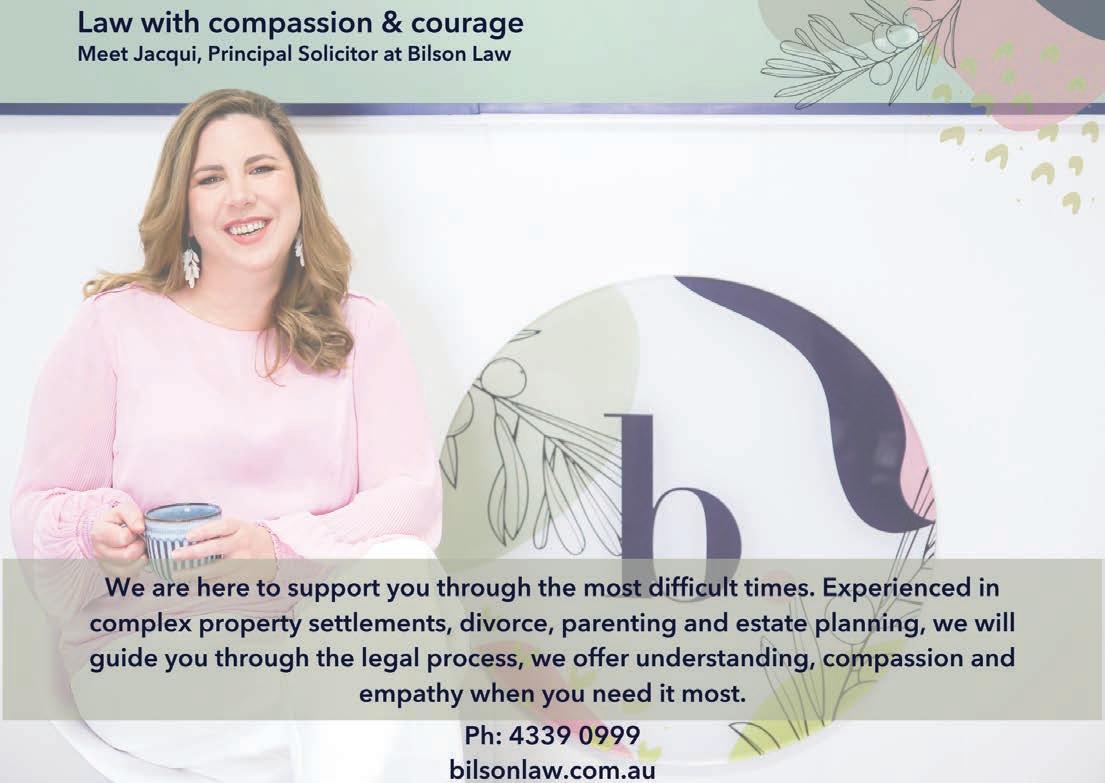
BY DR NICHOLAS ALTUNEG, BEHAVIOURAL OPTOMETRIST
As we reach our 50s and beyond, maintaining healthy eyesight becomes even more crucial. Age–related vision changes and eye conditions become increasingly common with each passing decade. Here's why eye care professionals can’t stress enough the importance of regular comprehensive eye exams for adults over 55.
Comprehensive exams don’t just check for glasses prescriptions, but use advanced screening techniques to detect many eye diseases and conditions before irreversible vision loss occurs.
As we reach our 60s, 70s and beyond, the risks of developing several vision–robbing eye diseases and conditions increase significantly. Cataracts, a clouding of the eye’s natural lens, affects over 70% of Australians over the age of 75. Age–related macular degeneration, which damages the macula and central vision, is a leading cause of blindness for those over 60. Glaucoma, caused by excessive eye pressure damaging the optic nerve, can advance unnoticed until permanent vision loss occurs. Diabetic retinopathy,
a complication of diabetes, can also take its toll on sight. Other eye conditions like dry eye, floaters and flashes become more common too. While some degree of vision decline is normal with aging, serious permanent impairment is not inevitable if these diseases are detected and managed early through regular comprehensive eye exams.
Using high–tech screening tools like specialised imaging and eye mapping, optometrists can spot early signs of cataracts, retinal disorders, optic nerve damage and more – often years before patients are aware of any vision changes. Catching issues at their earliest onset is critical in preventing or minimising permanent vision loss and allowing for more effective treatment options.
While some think routine eye exams are only necessary if you notice vision problems like blurriness, headaches or eye fatigue, optometrists strongly advise otherwise. By the time symptoms appear, irreversible damage may already be done.
For many over 55, retirement means more time to pursue favourite pastimes and hobbies like golf, sewing, painting, reading and more. But age–related

By the time symptoms appear, irreversible damage may already be done
vision problems can severely affect your ability to participate in and enjoy these activities. Conditions like macular degeneration, cataracts or diabetic retinopathy can make it difficult or impossible to clearly see a sewing needle, read instructions, drive to the golf course, or appreciate the vivid colours of your painting subjects. That’s why it’s so important to be proactive about preventative eye care through regular comprehensive exams as you get older. Catching and treating any vision issues early allows you to correct problems and continue pursuing your hobbies and passions with clear, high–quality sight for years to come. Don’t let reversible vision impairments hamper your enjoyment of activities that bring you joy and enrichment in retirement.
SEEING CLEARLY BEHIND THE WHEEL
Maintaining healthy vision is especially critical for older adults who want to keep driving safely. Vision impairments from conditions like cataracts, glaucoma or macular degeneration can significantly impact driving abilities after age 55. Reduced peripheral vision, sensitivity to glare, poor night vision and slower reaction times pose real risks on the road. Regular comprehensive eye exams are essential for detecting these vision issues early before they progress and lead to accidents or driving cessation. Having an optometrist carefully monitor your eyes annually allows you to get properly treated and keep your sight sharp enough to extend your safe driving span for years or even decades longer. Prioritizing preventative eye care supports maintaining independence and mobility as you age.
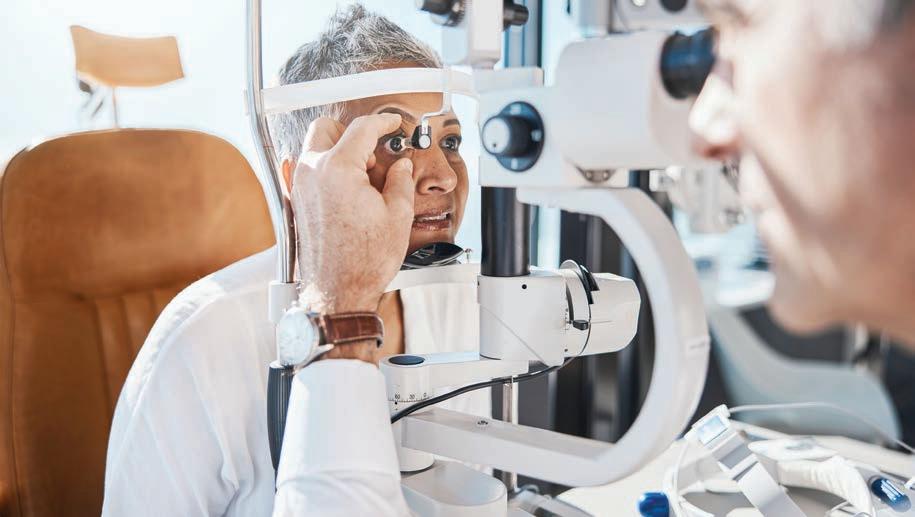
Did you know that one in three over 65s are hospitalised due to falls every year? Vision problems significantly increase the risk of falls and injuries for older adults. Reduced depth perception, peripheral vision, and visual acuity
Having your eyes thoroughly checked annually allows your optometrist to identify any areas of vision loss and get you the right treatment or prescription to restore sharper, wider sight
can make it difficult to perceive tripping hazards or misjudge stairs and curbs. Cataracts that limit night vision are a particular danger. Even subtle uncorrected refractive errors can blur your vision enough to throw off your balance and stability when walking or moving around. That’s why comprehensive eye exams are so vital for fall prevention as you age. Having your eyes thoroughly checked annually allows your optometrist to identify any areas of vision loss and get you the right treatment or prescription to restore sharper, wider sight. Eliminating preventable vision deficits goes a long way toward helping you maintain mobility, confidence and independence for years to come, minimising the risk of vision–related slips, trips and falls.
Prioritising preventative eye care with regular exams is a simple step that

Did you know that one in three over 65s are hospitalised due to falls every year? Vision problems significantly increase the risk of falls and injuries for older adults
could preserve your vision for years or decades more.
So while an hour or two each year for an exam may seem inconvenient, most optometrists view it as a small price to pay to catch any age–related issues early and protect your vision for the future. After all, we only get one pair of eyes to last us our entire lifetime.
This article is intended to promote understanding of and knowledge about general eye health topics. It should not be used as a substitute for professional advice, diagnosis, or treatment. Always seek the advice of your health care professional prior to incorporating this as part of your health regimen.
Dr Nicholas Altuneg is a Behavioural Optometrist who has been working on the Central Coast for almost 30 years. He is the co–founder at Eyes by Design, which is in the Kincumber Centre. Appointments can be made by phone 4369 8169 or online at www.eyesbydesign.com.au
Older Australians need to take extra care to look after themselves in the colder months, especially with the increased prevalence of flu and pneumonia during this time. Here are some top tips from Home Instead to help you prepare for winter.
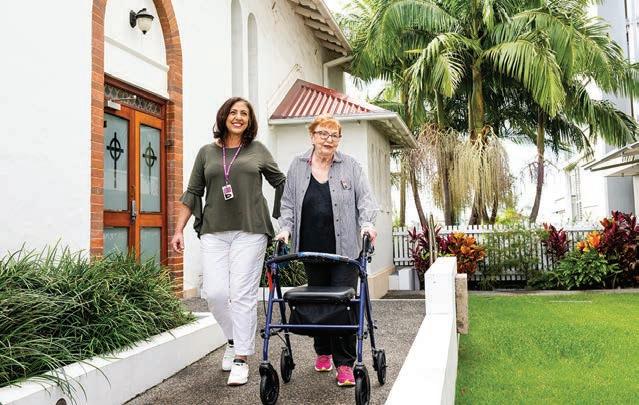
Flu is a serious risk to older people, especially during winter. Getting a flu shot is one of the most effective ways to protect against influenza. In Australia, the flu season typically runs from June to September, so it is important to get vaccinated before the start of winter. The flu shot is free for people over 65 years of age, as well as for younger people with certain medical conditions, such as asthma or diabetes.
As we age, our body’s ability to maintain a steady temperature decreases, making us more vulnerable to changes in temperature as we lose body heat faster, which can make us more susceptible to conditions such as hypothermia. As such, it’s important to keep warm during the winter months, both inside and out of the house. The best way to do this is by wearing warm clothing, particularly layers, wearing socks and slippers as well as using a blanket if you spend a large amount of time seated. Ensuring that your home is properly heated is vital, as is wearing coats, hats, scarves and gloves when you leave the house.
Eating a healthy diet is essential for maintaining good health and preventing illness. In the winter months, it’s important to eat a diet that includes plenty of fruit, vegetables,
and whole grains, which are high in vitamins and minerals that boost immunity. Eating foods that are high in protein, such as lean meats, fish, and legumes, can also help keep your energy levels up during the colder months. It is also important that you consume enough calories during the winter months to maintain your levels of body fat which help to keep you warm. Having hot meals such as porridge/ oatmeal and soup can also help you to feel warmer.
Staying hydrated is important for maintaining good health and preventing illness. During the winter months, it can be easy to forget to drink enough water, but it’s important to stay hydrated. Drinking plenty of water, herbal tea, and other non–caffeinated beverages can help keep you hydrated.
Exercise is crucial for maintaining physical health, especially during the winter months when it can be tempting to stay indoors. You can stay active by participating in indoor activities such as yoga, seated exercise or swimming. It is important to stay active throughout the day to maintain good circulation so try to get up and move around the house every hour or so.
Getting enough sleep is essential for overall health and wellbeing. Throughout winter, it’s important to ensure you get enough sleep, as lack of sleep can weaken your immune system and make you more vulnerable to illness. Aim for 7–8 hours of sleep per night and try to maintain a regular sleep routine.
7.
During winter, the days are shorter and the sunlight is less intense, which can lead to a vitamin D deficiency. Vitamin D, which is essential for bone health
Throughout winter, it’s important to ensure you get enough sleep, as lack of sleep can weaken your immune system and make you more vulnerable to illness
and immune function, can be boosted by spending time outside during the day when there’s a bit of sunshine, even if it is just for a few minutes. You may be able to take vitamin D supplements
to complement this, but make sure you speak with your healthcare professional about doing so beforehand.
Winter can be a challenging time for mental health, especially for those who may be dealing with seasonal affective disorder (SAD), a type of depression that occurs during the colder months due to reduced sunlight. Be sure to prioritise your mental health by practising self–care activities such as reading, listening to music, or taking a relaxing bath. If you find yourself experiencing symptoms of depression or anxiety, speak with your GP as soon as possible.
The winter months can be lonely and isolating, especially for those who may not be able to get out and about as much. However, staying connected with family and friends is important for mental health and wellbeing. You can do this by utilising technology such
as video calls, social media, or email to stay in regular contact. Alternatively, getting involved in community events or joining a social group to meet new people can be beneficial and transport services are available in the community to help facilitate this.
If you are feeling lonely during the winter months, companionship services can help and may be able to take you to appointments, shopping and to your social activities. Home Instead provides in–home care to help you to maintain your independence in your own home. We provide services such as home help including domestic assistance, meal preparation and socialisation, as well as
providing other services such as transport, personal care and dementia care.
For more information on our care services contact our local Home Instead office on (02) 4342 3477 or care@homeinstead-ccn.com.au www.homeinstead.com.au

About Home Instead: Established in 2013, Home Instead is a locally based in–home care and companionship service on the Central Coast. We are committed to making a positive difference in the lives of local seniors and their families and we take pride in every aspect of their care to ensure they have access to the best quality care services and support they need to continue living, safely, independently, and happily in the comfort of their own home

Keith Potger, founding member of iconic folk group
The Seekers, is set to captivate audiences with his solo tribute show, Celebrating The Seekers – 60 Years, presented live by the FunHaus Factory in Gosford Sunday 18 August. This special event promises an unforgettable audio–visual experience, featuring rare footage and photos that trace The Seekers’ journey to international fame since their formation in 1962.
Keith Potger’s unique role in The Seekers, known for his 12–string guitar and vocal arranging prowess, shaped the group’s distinctive sound and success. In this tribute, Keith not only covers timeless favourites from The Seekers but also showcases original ballads from his acclaimed solo albums and classic hits spanning the ‘60s to the ‘80s. Audiences can expect engaging stories and anecdotes from Keith’s nearly six–decade–long career in the music industry.
A self–taught musician, Keith Potger’s musical journey pre–dates The Seekers’ meteoric rise in the mid–1960s. His talent for crafting harmonies and composing memorable riffs, such as those in chart–toppers like “I’ll Never Find Another You” and “A World Of Our Own,” underscored
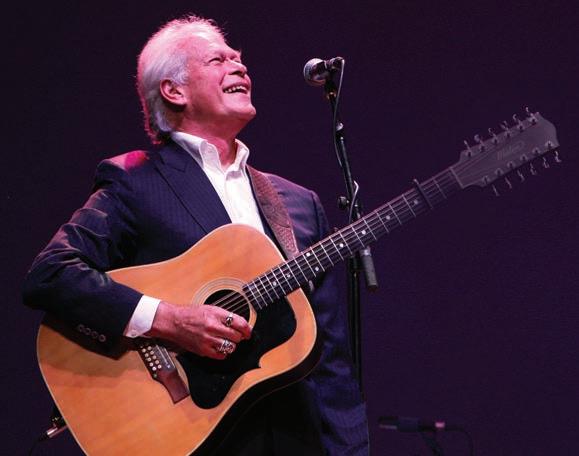
the group’s global acclaim. The Seekers, honoured as Australians Of The Year in 1967, remain the only musical group to receive this prestigious recognition.
Since The Seekers disbanded in 1968, Keith has continued to contribute to the music scene as a songwriter, producer, and solo performer. His solo career has seen him release multiple albums, including Secrets Of The Heart, Sunday, and Smile Now, each showcasing his musical evolution and storytelling prowess.
Keith Potger’s live performances are celebrated for their intimate charm and musical variety, appealing to fans who grew up with The Seekers’ albums. His

recent shows have garnered praise for their warmth and audience engagement, highlighting his enduring connection with fans worldwide.
Don’t miss this opportunity to experience Keith Potger’s tribute to The Seekers, blending nostalgia with new musical horizons, at the FunHaus Factory in Gosford. The show kicks off at 5:30pm, make it a dinner and a show, tantalize your taste buds with delectable offerings from Beau’s Burgers, featuring mouth–watering burgers, empanadas, and street food delights. And what’s a night of music without a refreshing cocktail (or mocktail) in hand?

